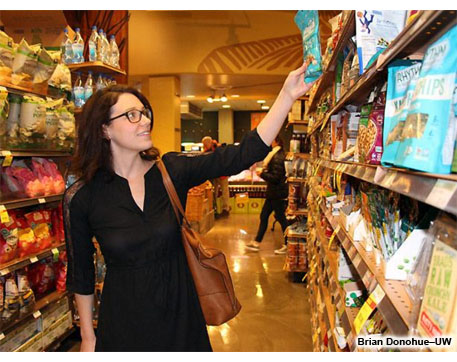STATE GOVERNMENT
Seattle’s minimum wage hasn’t boosted grocery prices
SEATTLE (Sept. 26, 2017) — Back in June, the University of Washington issued a working paper about Seattle’s minimum wage increase that found more people were working in the city at more jobs for higher pay, but still managed to find fault by suggesting that workers’ hours may have been cut in the process. (That paper, which had yet to be peer reviewed, is debunked here and here.) When it was released, free-market ideologues pounced. They quickly spread the report online and it ended up getting immediate and extensive coverage both locally and nationally.
So what do you suppose happened when the University of Washington released a study two weeks ago with uniformly positive news about Seattle’s minimum wage? Nothing but crickets. Here is the UW press release from Sept. 14:
Seattle’s minimum-wage hike didn’t boost supermarket prices
 Raising the minimum wage in Seattle to $13 an hour did not affect the price of food at supermarkets, according to a new study led by the University of Washington School of Public Health.
Raising the minimum wage in Seattle to $13 an hour did not affect the price of food at supermarkets, according to a new study led by the University of Washington School of Public Health.
That’s good news for those earning higher wages. “Typically, criticisms of minimum wage policies have been that even if wage goes up it will be offset by increases in prices of consumer goods,” said Jennifer Otten, assistant professor of environmental and occupational health sciences and a member of the School’s nutritional sciences faculty. “This paper shows that, as of Seattle’s wage increase to $13 per hour in 2016, food prices are not going up.”
The study was published in the International Journal of Environmental Research and Public Health.
A growing number of cities in the United States are raising the minimum wage in an effort to improve the well-being of low-wage workers, but few studies have looked at the public health implications of these policies, including effects on food security, diet quality, and associated health outcomes. This is the first study of the effects of a minimum wage policy this size, and at the local level, on supermarket prices in real-time.
In Seattle, large employers, such as grocery retailers, were required to pay workers at least $11 an hour starting in April 2015, $13 an hour in January 2016, and $15 an hour in January 2017.
Otten and colleagues collected data from six supermarket chains affected by the policy in Seattle and from six others outside the city but within King County and unaffected by the policy. They looked at prices for 106 food items per store starting one month before enactment of the ordinance, one month after, and a year later.
Researchers found no significant differences in the cost of the market basket between the two locations at any point in time. A second analysis to assess the public health implications of potential differential price changes on specific items, such as fruits and vegetables, was also conducted and researchers found no evidence of price increases by food group. Meats made up the largest share of the basket, followed by vegetables, cereal, grains and dairy.
The study was funded the City of Seattle and the Laura and John Arnold Foundation. It is part of ongoing work of the UW Minimum Wage Study Team.
Analysis of supermarket food prices collected after the Seattle policy increased to $15 per hour is forthcoming. Otten, along with Heather Hill of the Daniel J. Evans School of Public Policy and Governance and James Buszkiewicz, a doctoral student in epidemiology, are also examining the links between minimum wage and health outcomes over time.





